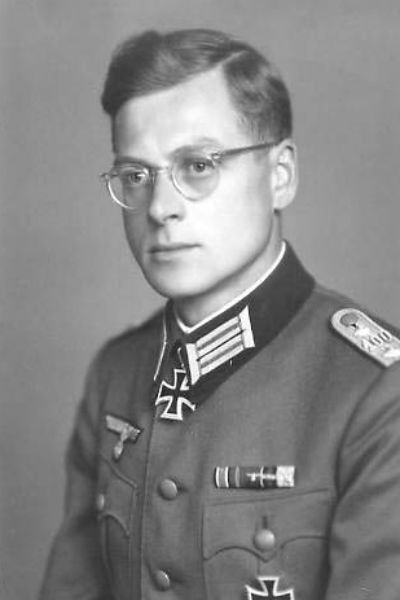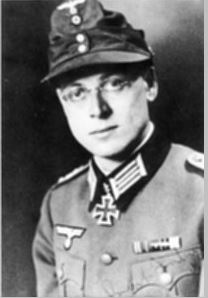Hodurek, Herbert
- Date of birth:
- February 10th, 1915 (Salzburg, Austria)
- Date of death:
- July 4th, 2003 (Salzburg, Austria)
- Nationality:
- Austrian
Biography
Herbert Hodurek finally reached the rank of Major. After the Second World War, Herbert Hodurek served with the Autrian Bundesheer, where he finally reached the rank of Oberstleutnant.
Do you have more information about this person? Inform us!
- Period:
- Second World War (1939-1945)
- Rank:
- Hauptmann (Captain)
- Unit:
- Führer, III. Bataillon, Gebirgsjäger-Regiment 144, 3. Gebirgs-Division, Heer
- Awarded on:
- April 15th, 1944
“The battle for the Nikopol bridgehead came to a head during the last days of November 1943. Utilizing strong infantry, tank, artillery and air forces as well as new assault tactics, the enemy attacked the weak forces of the Gebirgs-Jäger-Regiment 144 on the 25.11.1943. They concentrated on the III. Bataillon, led by Hauptmann Hodurek. The goal of the strong enemy units here (consisting of 100-120 tanks with mounted infantry and 1 rifle division) was to destroy the German units in the bridgehead. This was confirmed through prisoner interrogations.
Under the cover of night the Russian tanks and mounted infantry assembled from advanced positions and they overran the German lines at 04:30 after a very heavy artillery barrage had been laid on this frontline by artillery and mortars. The infantry dismounted on the hill as well as in the rear of the battalion command post and strongpoints. From here they advanced towards the artillery positions and the regimental command post. Immediately afterwards the second wave of tanks advanced to the German lines, turned around and began meandering back and forth through the positions. Within a very short time the troops in the trenches had been largely wiped out by flamethrowers and other close combat means. Now the enemy infantry stormed forwards, occupying the main battle line and immediately carrying their thrust to the north. Meanwhile the few strongpoints that were still holding out were locked in a fierce defensive battle with the attacking Russian infantry, who by now were attacking these from the flanks and rear.
In the middle of this fierce combat was the command post of the III. Bataillon under the command of Hauptmann Hodurek. From his observation post he had a clear view of the situation. As such he knew of the conditions of his Kompanien in the main battle line. However he could not deliver help, as there were no more reserves available. The wire and radio connections to the Regiment had both been knocked out, and no more messengers came through.
At this point in time it was probably possible for him to take the remnants of his Bataillon and breakthrough to the north. However Hauptmann Hodurek didn’t contemplate this. Instead he only had one thought; to persevere with the still remaining officers without thinking about whether the remaining front could be held or not.
The situation was quite desperate. At this time things were looking pretty hopeless as the enemy infantry began heading north in large concentrations along a broad front past the frontline and towards the north, where the battalion command post was located. However that did not dissuade Hauptmann Hodurek from his decision to hold the command post. True to his orders and with nerves of steel, his men allowed the enemy to get to a range of 50 metres away before greeting them with a hail of bullets. This attack was defeated.
Only now did the importance of this strongpoint show itself, as the place had long since been bypassed by the enemy on both the left and right. Thus the fury of the Russian attack fell upon the position, however it was also time for Hauptmann Hodurek to prove himself as a soldierly leader of uncommon quality.
He was the soul of the resistance. Ruthlessly committing himself to the battle, he jumped from squad to squad in the midst of perilous fire. In critical moments he himself fought with rifle and machine-gun in hand. He inspired his soldiers with confidence and courage, and so created a unified defensive spirit that deflected all enemy attacks.
At this time Hauptmann Hodurek was badly wounded. A still living Kompanie commander took over leadership of the Bataillon against the enemy, who were coming at them from all sides without desisting. The battle entered its critical phase, and then the Kompanie commander fell in battle.
Disregarding his severe wound, Hauptmann Hodurek once again took over leadership of the Bataillon and continued to lead the defensive battle while drawing on all the willpower he could muster. The situation had become even more perilous due to the shortage of ammunition. However even in this moment Hauptmann Hodurek showed himself to be a leader of rare energy and resilience. He intervened actively in the battle, organizing the still available forces in such a way that they were dealing with the strongest threats.
And so Hodurek’s strongpoint, under the leadership of its heavily wounded commander, was able to resist all onslaughts of the enemy. The deed of Hauptmann Hodurek was singular and decisive for the battle. His independent decision to hold his position to the last breath was decisive for the overall course of the fighting. The personal bravery of Hauptmann Hodurek was exceptional when assessed by any conceivable measure.”
- Period:
- Second World War (1939-1945)
- Period:
- Second World War (1939-1945)
- Period:
- Second World War (1939-1945)
- Period:
- Second World War (1939-1945)
- Period:
- Second World War (1939-1945)
- Period:
- Second World War (1939-1945)










